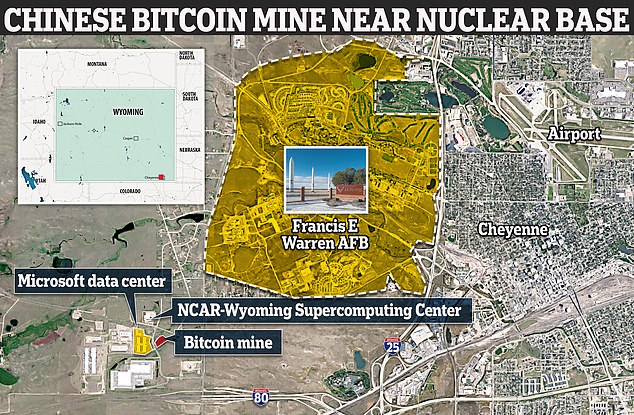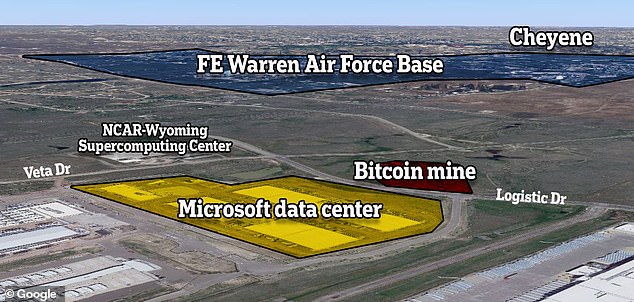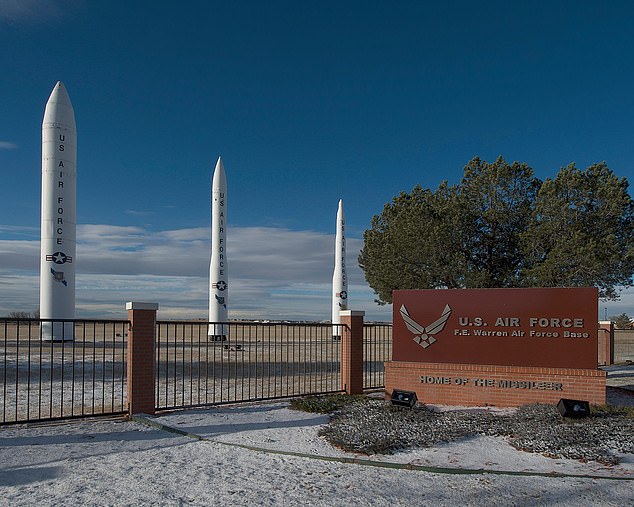Chinese Bitcoin mine in Wyoming sparks security fears over proximity to nuclear missile base and Microsoft data center – as defense experts warn of threat to power grid from similar operations across the US
A China-linked Bitcoin mine in Wyoming is raising security concerns because of its proximity to a Microsoft data center and an Air Force base that controls nuclear missiles.
In an August 2022 confidential report to the Committee on Foreign Investment in the United States, Microsoft warned that the mine could allow the Chinese to “pursue full-spectrum intelligence-gathering operations.” New York Times Friday report.
The Bitcoin operation, which has an opaque web of ownership but is linked to at least one Chinese company, is directly across the street from a secure Microsoft data center that supports the Pentagon, and about a mile away from FE Warren Air Force Base, home to the 90th Missile Wing.
Since China’s ban on Bitcoin mining in 2021, Chinese companies have increasingly looked to the US as a base of operations, using buildings full of powerful computers to earn tokens for processing cryptocurrency transactions.
While many mines may simply be money-making ventures, their massive computing power and huge energy needs raise concerns among defense experts that they could be used for espionage, or a coordinated disruption of the electrical grid.

A China-linked Bitcoin mine in Wyoming raises security concerns due to its proximity to a Microsoft data center and

An overview shows the relationship of the Bitcoin mine to nearby data centers and Warren AFB
The Times investigation identified Chinese owned or operated Bitcoin mines in at least 12 US states, including Arkansas, Ohio, Oklahoma, Tennessee, Texas and Wyoming.
Collectively, they use enough energy to power 1.5 million homes.
The mining operation in Cheyenne, which consists of a cluster of small buildings filled with racks of powerful computers, drew concern from neighboring Microsoft as soon as construction began on it last year.
“Microsoft has no direct indications of malicious activity by this entity,” Microsoft said in its 16-page report to the Committee on Foreign Investment, which monitors threats posed by overseas investors.
Pending further discovery, however, we raise the possibility that the computing power of an industrial-level crypto-domination operation, coupled with the presence of an unidentified number of Chinese nationals in direct proximity to Microsoft’s data center and one of three strategic missile bases in the US, presents significant threat vectors,’ the report added.
A Microsoft representative did not immediately respond to a request for comment from DailyMail.com on Friday morning.
Of less strategic concern, the Wyoming mine is also located near the NCAR-Wyoming Supercomputing Center, a facility that provides high-power computers to atmospheric and weather researchers.
US government officials confirmed last week that they had been monitoring the Wyoming operation for months, according to the Times.
One official, who spoke on condition of anonymity, said measures had been taken to mitigate possible intelligence gathering at the site, but declined to provide details.
The mining company also said it responded to inquiries from the Federal Investment Committee.
The Cheyenne mine site is linked to five companies, all of which share the same Manhattan address on Park Avenue, according to the Times.
None of the companies were found to have direct ties to the Chinese government or Communist Party. But one of them, Bit Origin Ltd., is registered in the Cayman Islands and was a Chinese pork processing company until last year.

The Bitcoin operation is directly across the street from a secure Microsoft data center, and about a mile away from FE Warren Air Force Base (above), home of the 90th Missile Wing

A worker is seen in a file photo at a cryptocurrency mine. The large computing power and large energy requirements of such enterprises are of concern to defense experts
Li Jiaming, president of Bit Origin, told the Times that the Wyoming site was chosen because of a favorable deal with the local electric utility provider, not because of its proximity to Microsoft or the missile base.
“Even though we are a Microsoft neighbor and a few kilometers from the base, it is nothing without power – the business cannot succeed,” he said.
At full capacity, the Cheyenne mine would require enough electricity to power 55,000 homes, highlighting the huge power consumption of such operations.
Bitcoin mines are also unique in their ability to turn on or off at a moment’s notice, which some defense experts have warned could make them a tool to disrupt the delicate power grid.
Brian Harrell, a former assistant secretary for infrastructure protection at the Department of Homeland Security during the Trump administration, told the Times that the mines could put “enormous stress” on the grid if they work together.
If Chinese “infrastructure is impacting key energy systems,” Harrell said, “it should immediately initiate additional scrutiny and investigation.”

A missile combat team sits at the control console inside the launch control center at FE Warren Air Force Base in a file photo
Even mining operations without malicious intent can be vulnerable to manipulation through backdoor attacks, some experts have warned.
Bitmain, a Chinese company that makes specialized computers for mining Bitcoin, has a global market share of 76 percent, according to a June report from Coinmetrics.
Bitmain has no apparent direct ties to the Chinese government, but the Times investigation found that some exports were sent to the US through a subsidiary located in a Communist Party compound in southern China.
In 2017 and 2019, security researchers issued warnings about apparent “backdoor” vulnerabilities in Bitmain hardware that could allow the company to remotely control the machines.
A February report from the Office of the Director of National Intelligence warned that China is ‘almost certainly capable of launching cyberattacks that could disrupt critical infrastructure services within the United States.’
“If Beijing fears a major conflict with the United States is imminent, it will almost certainly consider undertaking aggressive cyber operations against US homeland critical infrastructure and military assets worldwide,” the report warned.
“Such a strike would be designed to deter US military action by impeding US decision-making, causing social panic and interfering with the deployment of US forces,” the report added.
